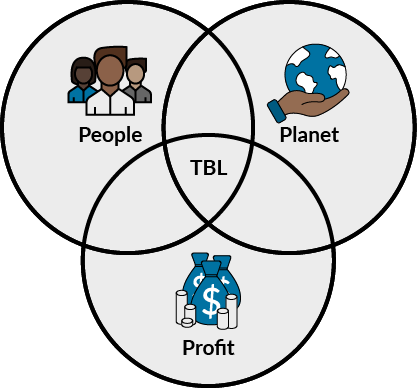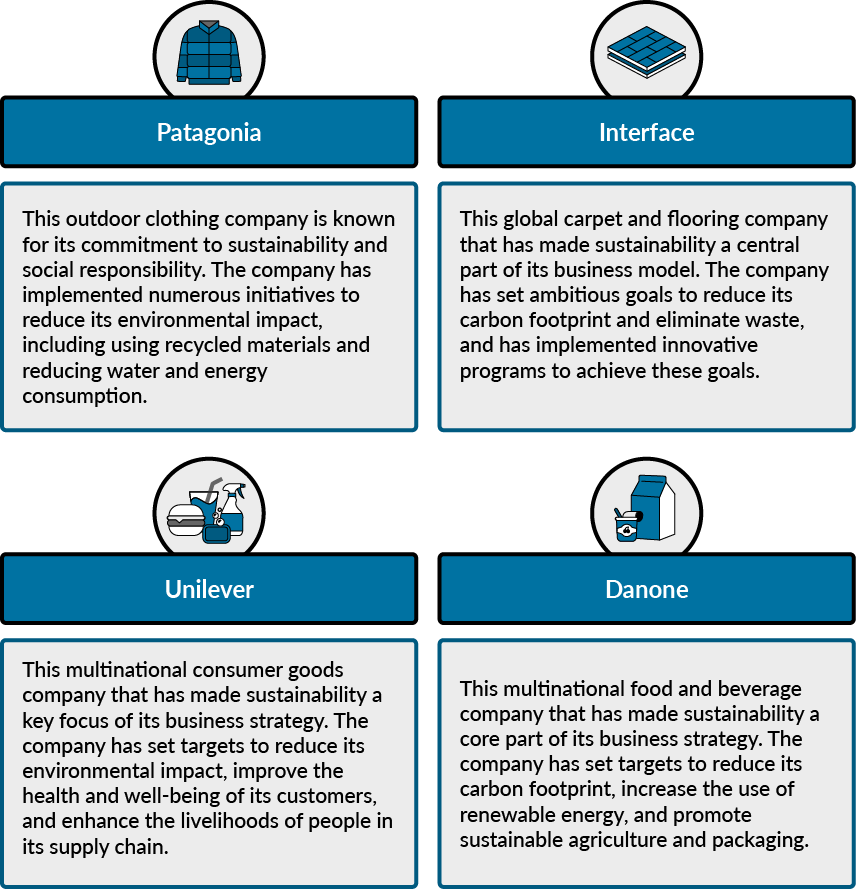Triple Bottom Line
The triple bottom line (TBL) is a concept that suggests that businesses should not only focus on financial performance (the traditional “bottom line”), but also on their social and environmental impact. It measures a company’s success based on three interconnected and equally important pillars:

Profit (economic): Refers to the financial performance of the organization and its ability to generate profit and financial growth.
People (social): Refers to the organization’s impact on people, including employees, customers, suppliers, and the broader community. It focuses on factors such as social equity, human rights, labor standards, and community development.
Planet (environmental): Refers to the impact of the organization on the natural environment, including the use of resources, energy consumption, pollution, and waste.
As is evident by the diagram the three components of the TBL – economic, social, and environmental – are interrelated and impact each other. A business that prioritizes economic sustainability over environmental or social sustainability, for example, may ultimately harm its long-term prospects by ignoring the potential costs of environmental damage or negative social impact. In contrast, a business that prioritizes all three components of the TBL can achieve sustainable success over the long term.
There are several benefits of adopting a TBL approach for businesses, including:
- Improved reputation: A business that is committed to sustainability and social responsibility is likely to have a better reputation among its customers, employees, and investors.
- Cost savings: Adopting sustainable practices can help businesses reduce costs by reducing waste, improving efficiency, and using resources more effectively.
- Increased innovation: Businesses that focus on sustainability and social responsibility are more likely to invest in research and development to find new and innovative ways to reduce their environmental impact.
- Attraction and retention of talent: Employees are increasingly seeking out employers who share their values and are committed to social responsibility, so adopting a TBL approach can help attract and retain top talent.
- Reduced risk: By taking a TBL approach, businesses can reduce their exposure to risks associated with environmental, social, and governance issues, such as legal and regulatory penalties, reputation damage, and supply chain disruptions.
Some examples of companies that follow a TBL approach are:

Patagonia: The outdoor clothing company Patagonia is known for its commitment to sustainability and social responsibility. The company has implemented numerous initiatives to reduce its environmental impact, including using recycled materials and reducing water and energy consumption.
Interface: Interface is a global carpet and flooring company that has made sustainability a central part of its business model. The company has set ambitious goals to reduce its carbon footprint and eliminate waste, and has implemented innovative programs to achieve these goals.
Unilever: Unilever is a multinational consumer goods company that has made sustainability a key focus of its business strategy. The company has set targets to reduce its environmental impact, improve the health and well-being of its customers, and enhance the livelihoods of people in its supply chain.
Danone: Danone is a multinational food and beverage company that has made sustainability a core part of its business strategy. The company has set targets to reduce its carbon footprint, increase the use of renewable energy, and promote sustainable agriculture and packaging.
Overall, adopting a TBL approach can help businesses achieve long-term success by balancing economic, social, and environmental considerations, and creating value for all stakeholders. By considering all three of these dimensions, the TBL provides a more comprehensive and sustainable way of measuring business success. It recognizes that businesses cannot succeed in the long term if they only focus on financial performance and ignore their social and environmental impact.